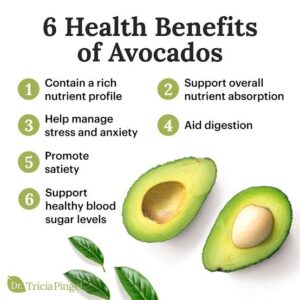Health benefits of Avocados
|
Avocados are one of the most rich, delicious, and satisfying foods on the planet. But as a nutritionist, I'm also happy to report that an avocado is a powerhouse superfood. These luscious gems—which are technically fruits, though I categorize them as "good" fat—are packed with anti-aging, disease-fighting antioxidants and nearly 20 different vitamins and minerals.
Just take a look at the nutritional profile from the US Department of Agriculture: One whole Hass avocado—without the skin and seed—provides 227 calories, primarily from 20 grams of healthful fat; almost 3 grams of protein; and about 12 grams of carbohydrate with 9 grams as fiber (3 grams net carb). That’s over 30% of the daily fiber target. One whole avocado also supplies 30% of the daily value for folate, a B vitamin needed to make new healthy cells; 36% for vitamin K, necessary for blood clotting and bone health; 20% for immune and skin supporting vitamin C; 13% for vitamin E, an antioxidant that also supports immune function; 20% for potassium, needed for heart, muscle, and nerve function and blood pressure regulation; and 10% for magnesium, a mineral required for over 300 reactions in the body, including heartbeat, bone health, blood sugar regulation, and nerve and muscle function.
They boost satiety
Eating "good" fats helps to slow stomach emptying, which keeps you fuller longer and delays the return of hunger. That satisfied feeling is known as satiety. Avocados—whose fat content mostly comes in the form of heart-healthy monounsaturated fatty acids, or MUFAs—certainly fit the bill. In one study, volunteers rated feelings of satisfaction and appetite after dining on meals with or without avocado. The addition of half of an avocado to meals resulted in a significant boost in self-reported satiety and a reduced desire to eat for up to five hours. This is one of the reasons I often reach for guacamole as my salad dressing.
They're waist whittlers
The notion that eating fat makes you gain weight is wrong. The truth is, eating "healthy" fats is actually a savvy weight loss strategy. For example, in addition to upping satiety, plant-based fats like avocado provide antioxidants and fight inflammation, which have both been linked to weight management. That may be why research has revealed that regular avocado eaters weigh less and have smaller waists, even without eating fewer calories.
They protect your ticker
The MUFAs in avocados have been shown to slash "bad" LDL cholesterol and up "good" HDL levels—a double effect that helps to lower the risk of heart disease, the number one killer in the US. An older study out of UCLA also uncovered some remarkable heart-protective effects of avocado consumption: Compared to eating a burger without avocado, the addition of half of a Hass avocado curbed the production of compounds that contribute to inflammation, improved blood flow, and didn't increase triglycerides (blood fats) beyond the amounts raised by the burger alone. Avocados are also a source of potassium, a nutrient that helps reduce blood pressure by acting as a natural diuretic to sweep excess sodium and fluid out of the body, which relieves pressure on the heart and arteries (bonus: that also means avocado is a natural de-bloater!).
They're nutrient boosters
Enjoying avocado at mealtime can help your body absorb more antioxidants from other healthy foods. In one Ohio State study, when men and women ate salads and salsa topped with 2.5 tablespoons of avocado, they absorbed over eight times more alpha-carotene and 13 times more beta-carotene–phytonutrients known to fight cancer and heart disease. Another study found that pairing avocado with tomato sauce and carrots boosts absorption of the veggies' vitamin A, a key nutrient needed for healthy skin, vision, and immunity.
They're good for your gut
Avocados have a positive impact on the gut microbiome, the trillions of microbes and their genetic material that live inside the digestive tract. A healthy microbiome has been linked to stronger immune function, anti-inflammation, and chronic disease protection. In a 2021 study from The Journal of Nutrition, adults who were overweight or obese were randomly assigned to consume a meal each day that either did or did not include an avocado. The diets, which were followed for 12 weeks, were designed to maintain body weight as to eliminate the effect of weight loss on the study's results. Researchers found that over the three-month period, avocado eaters experienced positive changes to the gut makeup. This included greater microbe diversity and an increase in microbes that produce metabolites that support gut health. Researchers also found that while the avocado group consumed slightly more calories, more fat was excreted in their waste, meaning some of the calories weren't absorbed from the gut into the blood stream. This may be another way avocados contribute to weight management.

|
|
